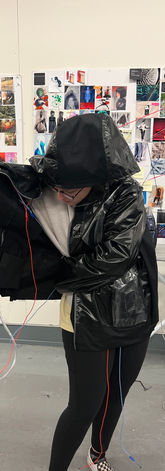



NEURODIVERGENT USERS AND NAVIGATING THE WORLD
Neurodivergent diagnoses are at an all-time high and a common issue experienced by neurodivergent users is sensory overload. Sensory overload is when your five senses - sight, hearing, smell, touch, and taste - take in more information than your brain can process.
Deep pressure therapy and meditation are methods of dealing with sensory issues.
RESEARCH
15-20%
of the world's population exhibits some form of neurodivergence.
Some neurodivergent characteristics (e.g., difficulty with organization, and sensory issues) present challenges in traditional work. Some techniques that can help alleviate these challenges are deep pressure therapy and meditation.

Deep Pressure Therapy
Deep pressure or deep touch pressure therapy (DTP) is firm tactile sensory input that provides proprioceptive input to the whole body. This can consist of firm hugs, firm strokings, cuddling, hugging, squeezing, compression, or swaddling. When administered to the whole body, deep touch pressure therapy (DTP) has a calming, organizing effect on children and adults alike.

Meditation
There are consequences for living in an overstimulated society. Sensory overload can negatively affect our physical and mental well-being. It’s vital to practice methods to reduce overstimulation when possible. Meditation can help your brain get away from the habit of excessive multitasking.
Observational Research

Conceptual Framework

IDEATION


MODEL
Final Model


FEATURES

Haptic Motors
10 in total
4 in chest
3 for each arm
The motors pulsate in a meditation for the user to follow when overwhelmed

Deep Pressure Therapy Vest
Inflates and provides deep pressure therapy for user.















